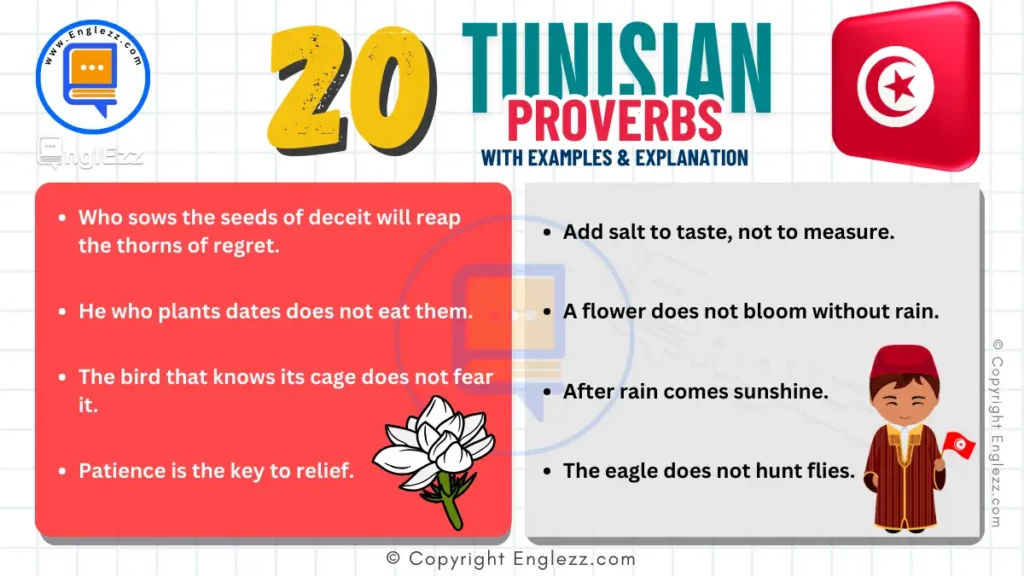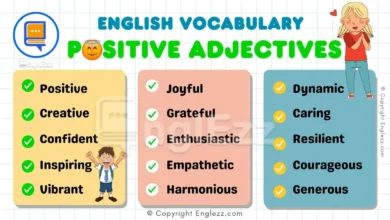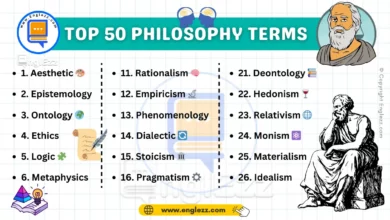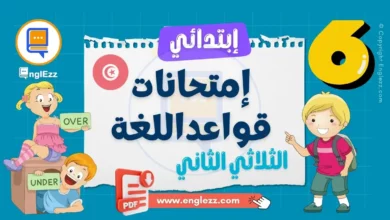Proverbs are a window into the cultural and social fabric of a community, offering timeless wisdom passed down through generations. In Tunisia, a North African country with a rich history, proverbs play a vital role in daily communication. In this blog post, we’ll explore 20 originally Tunisian proverbs in English, providing their translations, explanations, and examples of how they can be used in everyday English conversations.
Table of Contents
- 20 Unique Tunisian Proverbs in English with Practical Examples
- #1. 🐪 “The camel cannot see its own hump.”
- #2. 🍃 “The wind does not blow as the ships wish.”
- #3. 🔥 “A fire starts with a single spark.”
- #4. 🥄 “He ate with the spoon and got beaten with the stick.”
- #5. 🌾 “Who sows the seeds of deceit will reap the thorns of regret.”
- #6. 🌧️ “After rain comes sunshine.”
- #7. 🐦 “The bird that knows its cage does not fear it.”
- #8. ⏳ “Patience is the key to relief.”
- #9. 🕊️ “He who has no peace within will find no peace without.”
- #10. 🐍 “Beware of the snake that does not hiss.”
- #11. 🌍 “The world is a small village.”
- #12. 🕳️ “Do not dig a hole for your brother, for you might fall into it.”
- #13. 🌸 “A kind word is like a spring day.”
- #14. 🍂 “The leaf that falls in autumn does not return to its branch.”
- #15. 🧂 “Add salt to taste, not to measure.”
- #16. 🌼 “A flower does not bloom without rain.”
- #17. 🌱 “He who plants dates does not eat them.”
- #18. 🦅 “The eagle does not hunt flies.”
- #19. 🥣 “The soup cannot hide the flavor of the spoon.”
- #20. 🌕 “The moon is not covered by a sieve.”
- Tunisian Proverbs in English Table
- Tunisian Proverbs in English Printable
- Conclusion
20 Unique Tunisian Proverbs in English with Practical Examples
They often reflect the values, humor, and experiences of the Tunisian people, encapsulating life lessons in just a few words. By translating these proverbs into English, we open up a treasure trove of cultural insights, allowing readers from different backgrounds to appreciate the depth and beauty of Tunisian wisdom.
Whether you’re a language enthusiast or simply curious about Tunisian culture, these proverbs will offer you a unique perspective on life through the eyes of Tunisians.
#1. 🐪 “The camel cannot see its own hump.”
Original: “الجمل ما يشوف حدبته”
Phonetic:El jamel ma yshouf hadbto
Explanation: This proverb is used to describe people who can easily see others’ faults but are blind to their own. It’s a reminder to self-reflect before criticizing others.
Examples:
- “Don’t be so quick to judge; remember, the camel cannot see its own hump.”
- “She keeps pointing out his mistakes, but she should realize the camel cannot see its own hump.”
#2. 🍃 “The wind does not blow as the ships wish.”
Original: “الريح ما تجيش كما تشتهي السفن”
Phonetic:El rih ma tji kima tashtahi es-sfun
Explanation: Life doesn’t always go according to plan. This proverb emphasizes the unpredictability of life and the need for flexibility and resilience.
Examples:
- “We had everything planned, but the wind does not blow as the ships wish.”
- “He wanted to be a doctor, but the wind does not blow as the ships wish, and now he’s a successful artist.”
#3. 🔥 “A fire starts with a single spark.”
Original: “النار تبدأ بشرارة”
Phonetic:Ennar tbda bcherara
Explanation: Big problems or conflicts often start from small, seemingly insignificant issues. This proverb warns to address small issues before they escalate.
Examples:
- “Their argument started over something trivial, but remember, a fire starts with a single spark.”
- “Don’t ignore the small signs, because a fire starts with a single spark.”
#4. 🥄 “He ate with the spoon and got beaten with the stick.”
Original: “كل بالمغرفة واتضرب بالعصا”
Phonetic:Kul b el maghrfa w etdrab b el asa
Explanation: This proverb reflects the idea that someone may enjoy the benefits of something but also suffer the consequences. It’s a reminder that every action has a reaction.
Examples:
- “He enjoyed the perks of the job, but he ate with the spoon and got beaten with the stick when things went wrong.”
- “She took the easy way out, but now she’s paying the price—he ate with the spoon and got beaten with the stick.”
#5. 🌾 “Who sows the seeds of deceit will reap the thorns of regret.”
Original: “الي يزرع الكذب يحصد الندم”
Phonetic:Elli yezra3 el kithb yehsod el nedem
Explanation: This proverb serves as a warning that dishonesty and deceit will eventually lead to regret and misfortune.
Examples:
- “He thought he could get away with lying, but who sows the seeds of deceit will reap the thorns of regret.”
- “In the end, her dishonesty caught up with her—who sows the seeds of deceit will reap the thorns of regret.”
#6. 🌧️ “After rain comes sunshine.”
Original: “بعد المطر يجي الصحو”
Phonetic:Ba3d el matar yeji es-sehou
Explanation: This proverb is an expression of hope, reminding us that difficult times will eventually pass, and good times will follow.
Examples:
- She’s going through a tough time, but after rain comes sunshine.”
- “Don’t lose hope—after rain comes sunshine.”
#7. 🐦 “The bird that knows its cage does not fear it.”
Original: “الطير الي يعرف قفصه ما يخافش منه”
Phonetic:Etayer elli ya3ref qafsu ma yekhafch menno
Explanation: Familiarity with a situation, even if it’s not ideal, can reduce fear. This proverb is about adapting to circumstances.
Examples:
- “He’s used to the pressures of his job—the bird that knows its cage does not fear it.”
- “She’s not worried about the challenges ahead—the bird that knows its cage does not fear it.”
#8. ⏳ “Patience is the key to relief.”
Original: “الصبر مفتاح الفرج”
Phonetic:Es-sabr meftah el-faraj
Explanation: Patience is often necessary to overcome difficulties, and it’s through patience that solutions and relief are found.
Examples:
- “It’s a tough situation, but remember, patience is the key to relief.”
- He waited for the right opportunity, knowing that patience is the key to relief.”
#9. 🕊️ “He who has no peace within will find no peace without.”
Original: “الي ما عندوش راحة في قلبه ما يلقاش راحة في الدنيا”
Phonetic:Elli ma3andouesh raha fi qalbou ma yalqash raha fi eddenya
Explanation: Inner peace is essential for happiness. This proverb suggests that true contentment must come from within.
Examples:
- “He travels the world seeking happiness, but he who has no peace within will find no peace without.”
- “She keeps searching for joy in material things, but he who has no peace within will find no peace without.”
#10. 🐍 “Beware of the snake that does not hiss.”
Original: “احذر الحية الي ما تصفرش”
Phonetic:Ihthar el heyya elli ma tesferch
Explanation: This proverb warns against underestimating people or situations that seem harmless. Sometimes, the most dangerous threats are the ones that go unnoticed.
Examples:
- “He seems nice, but beware of the snake that does not hiss.”
- “They trusted her blindly, forgetting to beware of the snake that does not hiss.”
#11. 🌍 “The world is a small village.”
Original: “الدنيا قرية صغيرة”
Phonetic:Ed-dnya qarya sghira
Explanation: This proverb reflects the idea that, despite the vastness of the world, people and events are interconnected, and news travels fast.
Examples:
- “It’s amazing how quickly word spread—truly, the world is a small village.”
- “She ran into an old friend halfway across the world—the world is a small village.”
#12. 🕳️ “Do not dig a hole for your brother, for you might fall into it.”
Original: “لا تحفر حفرة لأخيك تقع فيها”
Phonetic:La tehfer hofra li akhik, teqa3 fiha
Explanation: This proverb cautions against harming others, as the harm you intend may come back to you. It promotes fairness and kindness.
Examples:
- “He plotted against his colleague, but do not dig a hole for your brother, for you might fall into it.”
- “She tried to sabotage her friend, but do not dig a hole for your brother, for you might fall into it.”
#13. 🌸 “A kind word is like a spring day.”
Original: “الكلمة الطيبة كي نهار الربيع”
Phonetic:El kelma ettayba ki nhar rabi3
Explanation: This proverb emphasizes the power of kind words to bring joy and positivity, comparing them to the pleasantness of a spring day.
Examples:
- “He made her day with a compliment—a kind word is like a spring day.”
- “A simple thank you can brighten someone’s day—a kind word is like a spring day.”
#14. 🍂 “The leaf that falls in autumn does not return to its branch.”
Original: “الورقة الي تطيح في الخريف ما ترجعش للغصن”
Phonetic: *El warka
elli tti7 fi el kharif ma terja3ch lel ghosn*
Explanation: This proverb reflects the idea of irreversible actions or lost opportunities. Once something is done, it cannot be undone.
Examples:
- “He missed the opportunity—just remember, the leaf that falls in autumn does not return to its branch.”
- “Once trust is broken, it’s hard to restore—the leaf that falls in autumn does not return to its branch.”
#15. 🧂 “Add salt to taste, not to measure.”
Original: “زيد الملح على الذوق مش على القياس”
Phonetic:Zid el melh 3ala edhdhouq mech 3ala el qiyes
Explanation: This proverb is about using discretion and personal judgment rather than strictly following rules. It suggests flexibility in decision-making.
Examples:
- “When negotiating, add salt to taste, not to measure—know when to be flexible.”
- “She followed her instincts rather than the manual—add salt to taste, not to measure.”
#16. 🌼 “A flower does not bloom without rain.”
Original: “الزهرة ما تزهرش كان بالمطر”
Phonetic:Ez-zahra ma tzharch kan bel matar
Explanation: Growth and success often require challenges and hardships, just as flowers need rain to bloom.
Examples:
- “He became stronger after facing difficulties—after all, a flower does not bloom without rain.”
- “She’s going through a tough time, but remember, a flower does not bloom without rain.”
#17. 🌱 “He who plants dates does not eat them.”
Original: “الي يغرس النخل ما ياكلوش”
Phonetic:Elli yghares en-nakhl ma yaklouch
Explanation: This proverb speaks to the idea of working for the benefit of future generations, as those who plant date palms may not live to see their fruits.
Examples:
- “He worked hard to build the company, knowing that he who plants dates does not eat them.”
- “She invests in her children’s future, understanding that he who plants dates does not eat them.”
#18. 🦅 “The eagle does not hunt flies.”
Original: “النسر ما يصيدش الذبان”
Phonetic:En-nesr ma ysyedch edhdhban
Explanation: This proverb highlights the importance of focusing on worthy goals and not wasting time on trivial matters.
Examples:
- “He ignored the petty arguments—remember, the eagle does not hunt flies.”
- “She aims high in life, because the eagle does not hunt flies.”
#19. 🥣 “The soup cannot hide the flavor of the spoon.”
Original: “الحساء ما يخبيش طعم المغرفة”
Phonetic:El hessa ma ykhabbech ta3m el meghrfa
Explanation: This proverb suggests that the truth will eventually reveal itself, just as the flavor of the spoon can be detected in the soup.
Examples:
- “No matter how much he tried to cover it up, the soup cannot hide the flavor of the spoon.”
- “The truth came out in the end—after all, the soup cannot hide the flavor of the spoon.”
#20. 🌕 “The moon is not covered by a sieve.”
Original: “القمر ما يتغطاش بالغربال”
Phonetic:El qamar ma yetghattach bel gherbal
Explanation: This proverb expresses that some truths are too obvious to be hidden, just as the moon cannot be concealed by a sieve.
Examples:
- “They tried to keep it a secret, but the moon is not covered by a sieve.”
- “Everyone knows the truth now—the moon is not covered by a sieve.”
Tunisian Proverbs in English Table
| 1. The camel cannot see its own hump. | 11. The world is a small village. |
| 2. The wind does not blow as the ships wish. | 12. Do not dig a hole for your brother, for you might fall into it. |
| 3. A fire starts with a single spark. | 13. A kind word is like a spring day. |
| 4. He ate with the spoon and got beaten with the stick. | 14. The leaf that falls in autumn does not return to its branch. |
| 5. Who sows the seeds of deceit will reap the thorns of regret. | 15. Add salt to taste, not to measure. |
| 6. After rain comes sunshine. | 16. A flower does not bloom without rain. |
| 7. The bird that knows its cage does not fear it. | 17. He who plants dates does not eat them. |
| 8. Patience is the key to relief. | 18. The eagle does not hunt flies. |
| 9. He who has no peace within will find no peace without. | 19. The soup cannot hide the flavor of the spoon. |
| 10. Beware of the snake that does not hiss. | 20. The moon is not covered by a sieve. |
Tunisian Proverbs in English Printable

Conclusion
Tunisian proverbs are a reflection of the country’s rich cultural heritage and the collective wisdom of its people. These sayings, passed down through generations, offer insights into life, human nature, and the values held dear by Tunisians.
Translating them into English not only preserves their essence but also makes them accessible to a global audience, allowing others to appreciate the depth of Tunisian thought. Whether you’re learning the language, exploring the culture, or simply interested in universal truths, these proverbs serve as a reminder that wisdom knows no borders.
As you reflect on these sayings, consider how they might apply to your own life and experiences. In doing so, you not only connect with Tunisian culture but also gain a broader perspective on the human condition.









🌍 Discover the wisdom of Tunisia through 20 timeless proverbs translated into English! 📜 Curious to learn more and explore how these proverbs can resonate with your daily life?
.
Don’t forget to follow and like @EnglEzz for more cultural insights! 👍✨
Dive into the full post here:
https://www.englezz.com/20-unique-tunisian-proverbs-in-english/
#englezz #TunisianCulture #Proverbs #Wisdom #LanguageLearning #CulturalHeritage #LearnEnglish